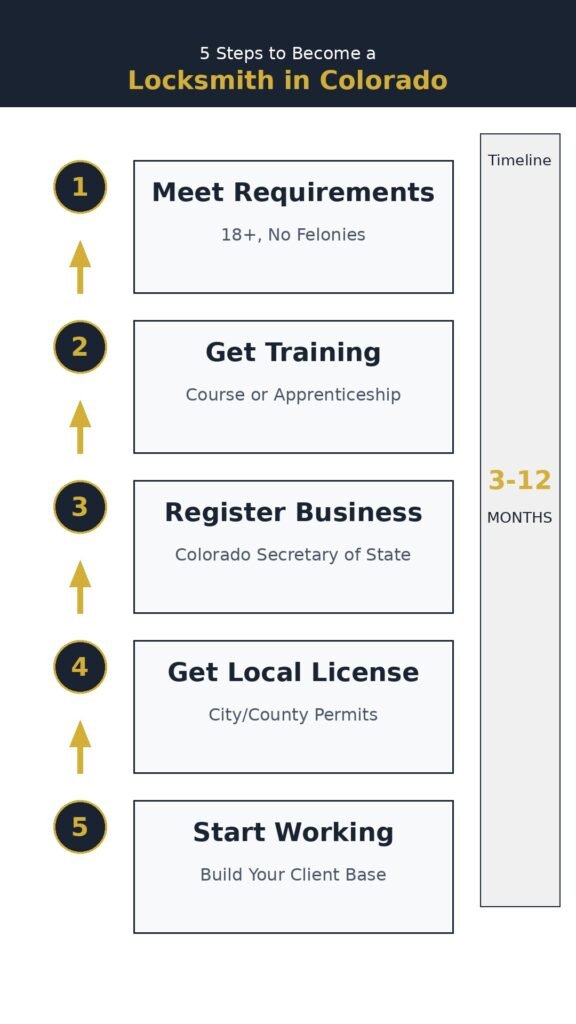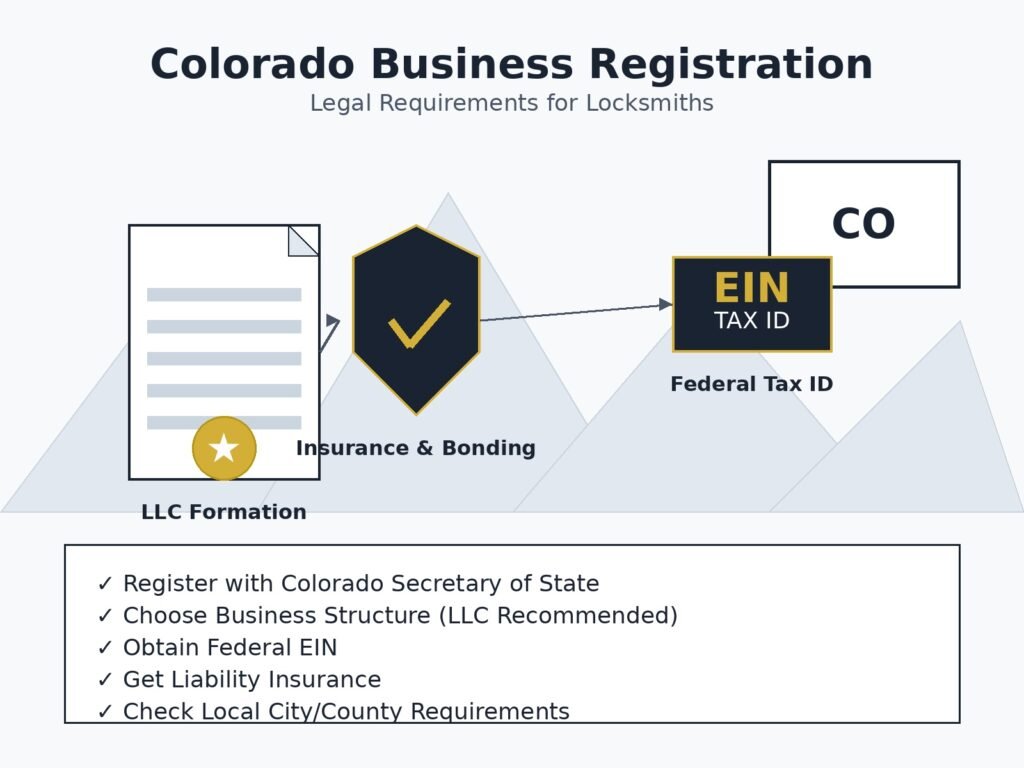To become a locksmith in Colorado, you must be at least 18 years old, have no felony convictions, complete locksmith training or an apprenticeship, register your business with the Colorado Secretary of State, and obtain required local licenses depending on your city or county.
We’ve helped dozens of aspiring locksmiths navigate Colorado’s requirements. Here’s everything you need to know.
Requirements to Become a Locksmith in Colorado
Colorado doesn’t make it overly complicated. You’ll need to meet these basic requirements:
- Minimum age: 18 years
- Legal work status in the U.S.
- No felony criminal record
- Locksmith training or hands-on experience
- Business registration (if self-employed)
- Local city or county licensing

Most people can start training immediately. The background check requirement protects homeowners and businesses, which makes sense when you’re literally holding the keys to someone’s property.
Does Colorado Require a Locksmith License?
Here’s the good news: Colorado does not have a statewide locksmith license.
But don’t celebrate yet. Many cities and counties require local permits or business licenses. We’ve seen requirements vary significantly across:
- Denver
- Colorado Springs
- Aurora
- Fort Collins
- Boulder
- Lakewood
Call your local city clerk’s office before you start working. Getting shut down for operating without a permit isn’t worth the headache.
Locksmith Training Options in Colorado
You’ve got two solid paths here. Most successful locksmiths combine both.
Formal Locksmith Training
Trade schools and online programs teach you the fundamentals fast:
- Trade schools: Hands-on training with real locks and keys
- Online locksmith courses: Flexible scheduling, lower cost
- Community college programs: More comprehensive, includes business skills
I recommend programs accredited by the Associated Locksmiths of America (ALOA). They’re recognized industry-wide.
Apprenticeship Programs
This is where you actually learn the business:
- Work under an experienced locksmith
- Gain real-world experience with residential, commercial, and automotive locks
- Build a client base while learning
- Get paid while training
We started as apprentices. You’ll learn more in three months of fieldwork than six months in a classroom.
How Long Does It Take to Become a Locksmith in Colorado?
It typically takes 3 to 12 months to become a locksmith in Colorado, depending on whether you choose formal training, an apprenticeship, or both.
Here’s the realistic timeline:
- Online courses: 2-4 months
- Trade school programs: 3-6 months
- Apprenticeship: 6-12 months
- Combined approach: 6-9 months
You can start taking small jobs after basic training. But you’ll need at least six months before you’re comfortable with automotive key programming and complex commercial systems.
Registering a Locksmith Business in Colorado
This is where most new locksmiths get stuck. Here’s the exact process:
- Register your business with the Colorado Secretary of State
- Choose a business structure (LLC recommended for liability protection)
- Get an EIN from the IRS (takes 15 minutes online)
- Open a business bank account (keep finances separate)
- Get liability insurance (non-negotiable)

The LLC protects your personal assets if something goes wrong on a job. We’ve seen locksmiths sued for damaged locks or break-ins—insurance saves careers.
Background Check and Insurance Requirements
Colorado doesn’t mandate background checks statewide, but don’t skip this step.
Background checks may be required by:
- Local city or county authorities
- Bonding companies
- Commercial clients who won’t hire you without one
General liability insurance is strongly recommended. You’re working with drills, picks, and expensive lock systems. One mistake can cost thousands.
Bonding may be required in certain cities. It protects your clients if you damage property or steal. Think of it as your professional credibility card.
Locksmith Tools and Equipment Needed
You’ll need to invest in professional tools. Here’s the starter kit:
- Key cutting machine ($200-$2,000 depending on quality)
- Lock pick set (get a quality set, not Amazon junk)
- Key programmers for automotive work (essential for car key programming)
- Drill and extractors for broken keys
- Code-cutting software for making keys without originals
Budget $3,000-$5,000 for a solid mobile setup. You’ll make it back in the first month if you’re hustling.
How Much Do Locksmiths Make in Colorado?
Locksmiths in Colorado earn an average of $45,000–$65,000 per year, with higher income potential for mobile and automotive locksmiths.
Here’s what we’re seeing in 2026:
- Entry-level: $35,000-$45,000
- Experienced: $50,000-$70,000
- Business owners: $80,000-$120,000+
Mobile locksmiths make more because they handle emergency lockouts. A single car lockout in Denver pays $75-$150. Do five of those on a Saturday night, and you’re looking at serious money.
Want to maximize earnings? Specialize in automotive work. Key fob programming and transponder keys pay significantly more than residential work.
FAQs
Is being a locksmith legal in Colorado?
Yes, locksmithing is legal in Colorado, but local licensing rules may apply depending on your city or county. Check with your local government before starting work.
Can I become a locksmith without training?
Yes, but training or apprenticeship significantly improves success and client trust. Most professional locksmiths complete some form of formal education.
Do locksmiths need insurance in Colorado?
Insurance is not mandatory statewide, but it’s strongly recommended. General liability insurance protects you from property damage claims and builds client confidence.
How do locksmiths verify they’re legitimate?
Professional locksmiths carry proper identification, show business licenses, and provide upfront pricing. Learn more about how locksmiths verify ownership before starting work.
Can a felon become a locksmith in Colorado?
Colorado doesn’t have a blanket ban, but felony convictions may prevent you from getting bonded or obtaining local licenses. Read our guide on whether felons can become locksmiths for more details.
How to Become Locksmith in the US?
Each US state may have its own requirements for eligibility, educational qualifications, training and licensing. Check the state-specific guide to know how to become a locksmith in your state in the US.
(*) States marked with an asterisk require state-level locksmith licensing or registration. Requirements vary by jurisdiction.

